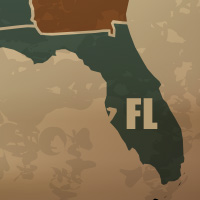Cannabis in the United States, Legality by State
There has been no better time than the present for the Cannabis industry. 43 US states and the District of Columbia have all passed laws either allowing the legal use of cannabis for medicinal purposes or legalizing it outright. Cannabis laws are changing so fast making it a bit confusing some times.
Alabama
Medicinal: Yes | Decriminalized: No
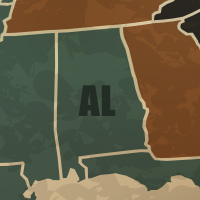
Medical use legalized in May 2021
Alaska
Fully Legal
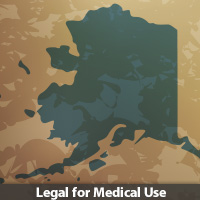
In Alaska, cannabis was decidedly legal (under state, but not federal, law) for in-home, personal use under the Ravin v. State ruling of 1975. This ruling allowed up to two ounces (57 g) of cannabis and cultivation of fewer than 25 plants for these purposes. A 1991 voter ballot initiative recriminalized marijuana possession, but when that law was eventually challenged in 2004, the Alaska courts upheld the Ravin ruling, saying the popular vote could not trump the state constitution. In response to former Governor Frank Murkowski's successive attempt to re-criminalize cannabis, the American Civil Liberties Union (ACLU) filed a lawsuit against the state. On July 17, 2006, Superior Court Judge Patricia Collins awarded the Case Summary judgment to the ACLU. In her ruling, she said "No specific argument has been advanced in this case that possession of more than 1 ounce (28 g) of cannabis, even within the privacy of the home, is constitutionally protected conduct under Ravin or that any plaintiff or ACLU of Alaska member actually possesses more than 1 ounce (28 g) of cannabis in their homes." This does not mean that the legal possession threshold has been reduced to one ounce, as this was a mere case summary review filed by the ACLU, not a full case. Reinforcing Ravin, Collins wrote "A lower court cannot reverse the State Supreme Court's 1975 decision in Ravin v. State" and "Unless and until the Supreme Court directs otherwise, Ravin is the law in this state and this court is duty bound to follow that law". The law regarding possession of cannabis has not changed in Alaska, and the Supreme Court has declined to review the case, therefore the law still stands at 4 ounces (113 g). However, federal prosecutions under the CSA can be brought in Federal Court, and federal courts applying federal law are not bound by state court precedent. As such, federal courts in Alaska will recognize that possession of any quantity of marijuana remains illegal in Alaska under federal law.
It should be emphasized that legal possession of cannabis is strictly noncommercial. The maximum legal limit is up to 4 oz (110 g) or 25 plants owned for personal use by adults in the privacy of their homes. Possessing more than 4 oz (110 g) or more than 25 or cannabis plants is a felony punishable by up to 5 years in jail and a fine of up to $50,000. Possession of any amount cannabis within 500 ft (150 m) of a school or a recreation center is also a felony punishable by 5 years jail time and a fine of up to $50,000; but if possession is noncommercial and the offender is in their a private residence, an affirmative defense may be raised in court. Possession of marijuana for Commercial reasons regardless of the amount is prohibited by law. Sale of less than 1oz is considered a misdemeanor punishable by one year jail time and a fine of up to $5000. Sale of more than one ounce of cannabis is a felony punishable by 5 years in prison and $50,000 fine. Furthermore, Alaskans cannot maintain any buildings or structures whose sole purpose is to house and or distribute marijuana plant. A petition of 45,000 signatures, originating from a marijuana regulation campaign was submitted to the Alaska Department of Elections on January 8, 2014. The campaign exceeded the required amount of 30,000 signatures from 30 of Alaska’s 40 voting districts to qualify. If the signatures are found to meet state regulations, the measure will appear on the August 19 primary election ballot. An 8 page act regarding the regulation of marijuana sales was drafted by both Alaska and Colorado citizens, based largely on the language used in Colorado's law.
Arizona
Fully Legal

Medical use legalized through Proposition 203 in 2010.
Recreational use legalized through Proposition 207 on November 3, 2020
Arkansas
Medicinal: Yes | Decriminalized: No

November 8, 2016: medical marijuana legalized when Issue 6 was approved by 53% of voters
California
Fully Legal

In California state law, Marijuana is defined as "all parts of the plant Cannabis sativa L., whether growing or not; the seeds thereof; the resin extracted from any part of the plant; and every compound, manufacture, salt, derivative, mixture, or preparation of the plant, its seeds, or its resin." (H&SC 11018). As of January 1, 2011, possession of 1 ounce (28 g) or less of marijuana is an infraction, punishable by a maximum $100 fine (plus fees) with no criminal record under Ca Health & Safety Code 11357b. (Prior to 2011, possession of 1 ounce (28 g) or less of marijuana was a misdemeanor, but convictions under this section are expunged from the record after two years under Health and Safety Code Sections 11361.5 and 11361.7.)
Possession of larger amounts of marijuana is a misdemeanor punishable by up to $500 and six months in jail under Health & Safety Code 11357c. Possession of hashish or concentrated cannabis is an optional misdemeanor or felony ("wobbler") under Health & Safety Code 11357a. However, under Prop. 36 first- and second- time possession-only offenders may demand a treatment program instead of jail. Upon successful completion of the program, their conviction is erased. Possession (and personal use cultivation) offenders can also avoid conviction by making a preguilty plea under Penal Code 1000, in which case their charges are dismissed upon successful completion of a diversion program.
Sale, transportation or distribution of marijuana is a felony under Health and Safety Code Sections 11360. Transporting or giving away one ounce or less is a misdemeanor punishable by a maximum $100 fine. Sale or distribution to minors is a felony under Health and Safety Code 11361. Possession with intent to sell any amount of marijuana is a felony under Health and Safety Code 11359.
Cultivation of any amount of marijuana is a felony under Health and Safety Code 11358. People who grow for personal use are eligible for diversion under Penal Code 1000 so long as there is no evidence of intent to sell. There are no fixed plant number limits to personal use cultivation.
It is illegal to drive while under the influence of marijuana (or alcohol or any other drug) by Vehicle Code 23152. "Under the influence" is not specifically defined in the statute, but is interpreted to imply some degree of impairment. Therefore the mere fact of having taken a toke of marijuana does not necessarily mean one is DUI. Drivers found in possession of less than 1 ounce (28 g) of marijuana in their vehicle are liable for a maximum $100 misdemeanor fine under Vehicle Code 23222 (larger amounts are punishable under H&SC 11357(a) and 11359). Any person under the age of 21 convicted marijuana related offences will face a 12-month drivers license suspension, regardless of whether the offense was driving-related. Unlike federal law, California law requires a conviction for forfeiture of property involved in a drug crime. Vehicles may be forfeited only if 10 pounds or more of marijuana is involved. Health and Safety Code 11470.
Medical patients and their designated primary caregivers may legally possess and cultivate (but not distribute or sell) marijuana under Health and Safety Code 11362.5 (Prop 215) if they have a physician's recommendation or approval. Medical marijuana patients are not protected while on federal park land or forest land in California. CalNORML has received reports of campers and those driving through federal land who are searched, charged with federal possession statutes, and had the marijuana they had obtained under a state medical recommendation confiscated. A California medical recommendation is not a defense in federal court to these charges.
Colorado
Fully Legal

In 1975, Colorado passed a law which made possession of one ounce or less of the cannabis plant a second degree petty offense only punishable by a fine of 100 dollars. Thirty years later, in 2005, the city of Denver passed another law which allowed adults over 21 years to possess up to one ounce of marijuana without penalty in the city.
But the state still imposed penalties for use and possession of marijuana.
In November 2012, the Campaign to Regulate Marijuana Like Alcohol, a ballot initiative campaign backed by the Marijuana Policy Project, successfully passed Amendment 64, making Colorado the only place in the world to have legalized the possession, use, production, distribution, and personal cultivation of marijuana (In the state of Washington non medical cultivation is still illegal). The Marijuana Policy Project also played a lead role in drafting and campaigning for the historic initiative. The amendment gained bipartisan support, with Coloradans voting for legalization at a higher rate than for President Obama. Arrangements for sale, packaging, advertising and taxation are now under discussion. It will remain illegal to be found driving under the influence of marijuana, while legal possession will be limited to over-21s only and quantities regulated. Growing up to six plants will be legal, while it will also be legal to give away small quantities.
Connecticut
Fully Legal
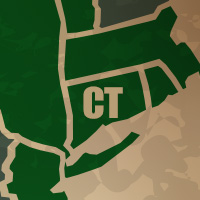
On June 30, 2011, Gov. Dan Malloy of Connecticut signed legislation into law decriminalizing the possession of small, personal use amounts of marijuana by adults. The new law, Senate Bill 1014, took effect on July 1.
Senate Bill 1014 reduces the penalties for the adult possession of up to one-half ounce of marijuana from a criminal misdemeanor (formerly punishable by one year in jail and a $1,000 fine) to a non-criminal infraction, punishable by a $150 fine, no arrest or jail time, and no criminal record. The new law similarly reduces penalties for the possession of marijuana paraphernalia.
Possession of larger amounts of marijuana is still illegal and punishable by imprisonment and monetary fines. A subsequent offense of possession of one-half ounce of marijuana is still a non- criminal infraction but the fine rises to $200–$500. First offense of possessing one-half to four ounces is a misdemeanor punishable by up to one year in prison and $1,000 in fine. A subsequent offense becomes a felony punishable by up to 5 years incarceration and $3,000 fine.
First offense of possession of 4 ounces or more is a felony punishable by 5 years imprisonment and $2,000 fine. Subsequent offenses are punishable by 10 years in jail and a fine of $5,000. The minimum mandatory sentence for possession of marijuana within 1,500 feet of a school is 2 years’ incarceration (without monetary fine) that runs consecutively with any other sentence.
Selling any amount of marijuana is completely illegal and a felony punishable by no less than 7 years in jail and $25,000 in fine. Selling to minors and possessing within 1,500 feet of a school or day care are both felonies which adds 3 years imprisonment to any other sentence imposed. There’s no monetary fine imposed.
On June 1, 2012, Governor Dan Malloy signed House Bill No. 5389, which allows the use of cannabis for certain "debilitating medical conditions."
District of Columbia
Fully Legal

On March 4, 2014, the Council of the District of Columbia voted 10-1 in favor of decriminalizing the recreational use of marijuana, replacing jail time for most offenses of private consumption with civil fines. The bill establishes a $25 penalty for the possession of up to one ounce of marijuana, and it labels public consumption a misdemeanor with a maximum penalty of $500 and up to six months in jail.
Georgia
Medicinal: No | Decriminalized: No

Hawaii
Medicinal: Yes | Decriminalized: Yes
Idaho
Medicinal: No | Decriminalized: No
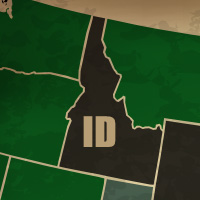
Illinois
Fully Legal

Indiana
Medicinal: CBD Only | Decriminalized: No

Iowa
Medicinal: CBD Only | Decriminalized: No
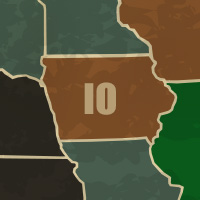
Kansas
Medicinal: No | Decriminalized: No

Kentucky
Medicinal: CBD Only | Decriminalized: No

Louisiana
Medicinal: Yes | Decriminalized: Yes

Maine
Medicinal: Yes | Decriminalized: Yes

Possession of less than 2.5 oz (71 g) is a civil violation, punishable by a fine of $200–400. Possession of 2.5 oz (71 g) or more is considered evidence of intent to distribute and is punished as such. Possession of a usable amount of marijuana is lawful if at the time of the possession the person has an authenticated copy of a medical record demonstrating that the person has a physician's recommendation. Possession of greater than one pound of marijuana is considered trafficking and is punishable by up to one year in jail and a fine of up to $2,000.
Cultivation of five plants or less of marijuana is punishable by up to six months in jail and a fine of up to $1,000. For greater than five plants, the penalties increase to up to one year in jail and a fine of up to $2,000. For greater than 100 plants the possible punishment is up to five years in prison and a fine of up to $5,000. For any amount of plants greater than 500, the penalties increase to up to ten years in prison and a fine of up to $20,000.
The penalty for sale of marijuana is up to one year in jail and a fine up to $2,000. The penalties increase to up to five years in prison and a fine of up to $5,000 if the sale was made to a minor or if it occurred within 1,000 ft (300 m) of a school or on a school bus.
Possession and personal use of paraphernalia is a civil violation punishable by a fine of $200. The sale of paraphernalia is punishable by up to six months in prison and a fine of up to $1,000, unless the sale was to a minor, in which case the penalty increases to up to one year in jail and a fine of up to $2,000. Upon conviction, the court may suspend or revoke the professional license of the offender.
In November 2013 Portland became the first city on the East Coast to legalize marijuana as voters passed an ordinance allowing adults to possess small amounts of the drug. Marijuana is still illegal under federal law, and is legal only for medical use under state law. Portland’s ordinance does not set up any legal way to obtain marijuana.
Maryland
Medicinal: Yes | Decriminalized: Yes

Possession of less than 10 grams of marijuana in Maryland is punishable by a fine of up to $500 and 90 days in jail.
In March 2013, Maryland state senate passed a bill (Senate Bill 297) to be considered by the house of delegates regarding the decriminalization of the possession or marijuana. The bill aimed to make the penalties for possession of less than ten grams of marijuana a civil offense punishable by up to a $100 fine with no time in jail. This Bill was denied on the 19 March however a bill to allow academic research studies of medical marijuana was passed.
A proposed bill that would remove all criminal and civil penalties for the possession of up to one ounce of marijuana, allow the personal cultivation of up to 6 marijuana plants by those over the age of 21 and create a system of retail marijuana stores, cultivation facilities, and marijuana product manufacturers is due to be introduced into legislation in early 2014.
Massachusetts
Medicinal: Yes | Decriminalized: Yes

In 2008, Massachusetts voters approved a ballot initiative to decriminalize a possession of up to an ounce of marijuana, and in 2009, ALM GL ch. 94C, § 32L was enacted into law, making possession of up to one ounce of marijuana a civil offense punishable by a penalty of $100 and forfeiting the drug. There are no other forms of civil or criminal punishments for offenders who are over 18 years of age. Minors are subjected to the same civil penalties as long as they complete the required drug awareness program and community service in accordance with section 32M of the same law. The civil punishment is increased to up to $1,000 if the offender fails to complete the drug awareness program and community service within one year of offense, at which point both the offender and parents are "severally" liable to pay the fine. The law is complicated by the fact that Massachusetts citizens are not legally required to identify themselves when cited with civil infractions. This makes it logistically impossible to enforce the fine.
In 2012, Massachusetts voters approved another ballot initiative to legalize possession and use of marijuana for medical purposes. The law puts medical marijuana under the jurisdiction of the state Department of Public Health, which is charged with setting up registration for patients and dispensaries and monitoring the business. Under the law, patients are allowed to possess a sixty-day supply (to be defined by the DPH) and appoint a representative to facilitate their use if they are incapable. The DPH is required to register at least one dispensary per county with a state-wide limit of 35.
Possession of more than one ounce of marijuana is a misdemeanor resulting into a $500 fine and up to six months' imprisonment with probation, after which records are sealed. Subsequent offenses are subjected to the same punishments but records are not sealed after probation.
The sale of less than 50 pounds of marijuana is a misdemeanor punishable by two years in prison with probation and a $5,000 fine. Subsequent offenders are subjected to up to 2½ years in prison without probation and a fine of $1,000–$10,000. Selling of more than 50 pounds is a felony punishable by 2½–15 years incarceration atop the minimum mandatory sentence(MMS). The MMS for selling up to 100 lbs is one year incarceration plus a fine of $500–$10,000. The MMS for selling 100–2000 lbs of marijuana is 3–15 years in prison and a fine of $2,500–$25,000. The MMS for selling 2000–10,000 lbs of marijuana is 5–15 years plus a fine of $5,000–$50,000 and that of selling more than 10,000 lbs of marijuana is 10–15 years incarceration plus up to $200,000 in fine. Selling marijuana within 1,000 feet of a school or 100 feet of a park is also a felony punishable by two years imprisonment in addition to the MMS and a fine of $1,000–$1,000.
Michigan
Medicinal: Yes | Decriminalized: Yes
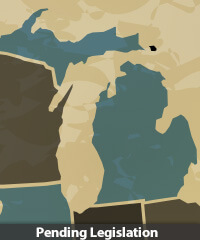
In the November election of 2008, more than 60% of Michigan voters supported Proposal 1, and Michigan thereby became the thirteenth state to legalize medical cannabis. On 4 December 2008, the Michigan Medical Marihuana Act was enacted, allowing patients with debilitating medical conditions such as HIV, cancer, and Hepatitis C to legally possess and use cannabis. The patient can have up to two and a half ounces of usable cannabis, and twelve plants kept in an enclosed and locked facility.
Recreational use of marijuana has not been decriminalized in the state of Michigan. Possession of any amounts of the plant is a misdemeanor punishable by up to one year incarceration and a $2,000 fine, while actual using is punishable by up to 90 days in jail and a $100 fine. If possession is in a public park, the sentence is at most 2 years and a $2,000 fine. Distributing marijuana without remuneration is a misdemeanor punishable by at most one year in jail and a $1,000 fine.
Additionally in the November 2012 election, the cities of Detroit and Flint decriminalized cannabis possession of an ounce or less for persons 21 years and older. Ypsilanti, Michigan passed an ordinance to make cannabis the lowest priority for law enforcement activity.
The sale and cultivation of cannabis is a felony punishable by up to 4–15 years imprisonment and $20,000-$10,000,000 in fines depending on the number of plants grown and the amount of usable cannabis sold.
Minnesota
Medicinal: Yes | Decriminalized: Yes
Missouri
Medicinal: Yes | Decriminalized: Yes
Mayor of St. Louis, Francis Slay posted an informal poll on his mayoral website in January 2014, asking his constituents whether or not they were in favour of the legalisation of recreational marijuana and by extension whether the citizens believe that Missouri ought to follow Colorado. The published results stated that over 90% of the people who voted were in favour of the implementation of legalised recreational usage of marijuana, and 70% supporting taxation upon its sale. 30% of those who supported this movement stating they had used the drug in the past week.
Montana
Medicinal: Yes | Decriminalized: Yes
Nebraska
Medicinal: No | Decriminalized: Yes
Nevada
Medicinal: Yes | Decriminalized: Yes
New Hampshire
Medicinal: Yes | Decriminalized: Yes
Currently, under New Hampshire state law, it is considered a misdemeanour to possess any amount of marijuana, subject to incarceration of up to 1 year and a maximum fine of $2000.
On the 15 January 2014 New Hampshire’s legislature voted 170 to 162 in favor of 'House Bill 492', based on Colorado Amendment 64, which seeks to legalize under state law the personal use of up to one ounce of marijuana by persons 21 years of age or older and establish regulations for the retail production and sale of cannabis. The vote to approve the bill is the first time a chamber of a state legislature has ever approved of legislation to legalize and regulate marijuana for all adults. Tax issues pertaining to the bill are yet to be debated and a second House floor vote is expected in early 2014.
New Jersey
Medicinal: Yes | Decriminalized: Yes
New Mexico
Medicinal: Yes | Decriminalized: Yes
New York
Medicinal: Yes | Decriminalized: Yes
In 1977, the state of New York also passed a law which decriminalized marijuana to a large extent. Possession of 25 g (0.88 oz) or less of marijuana, first offense, is a civil citation with a fine of $100 and the fine is increased to $200 for second offense. A third offense is a misdemeanor and the offender may get 5 days in jail and or pay $250 in fine. Possession of up to 2 ounces of marijuana is also a misdemeanor punishable by 3 months in jail and $500 in fines. Possession of 2 to 8 ounces (57 to 227 g) of marijuana is a class A misdemeanor that may be punishable by 1 year in jail or a $1000 fine or both. Possession of up to 16 oz (450 g) of marijuana is a class E felony punishable by 1–4 years in jail and a fine of $5000. Repeat offenders are mandated 6 months in jail plus a $5000 fine and/or an additional 3–4 years in jail. Possession of up to 10 lb (4.5 kg) of marijuana is a class D felony which is punishable by up to 15 years in jail and/or a fine of $5000 and second offenders must be incarcerated for at least 6 months. Possession of more than 10 lb (4.5 kg) is a class A felony also punishable by up to 15 years in jail and/or $5000 fine.
Selling or cultivation The selling of marijuana or cultivation of cannabis can be punished by prison sentences and fines which can vary with nature of the offence.
2 oz (57 g) or less is a class B misdemeanor punishable by jail time of 3 months and/or a fine of $500.
24 g (0.85 oz) sale is class A misdemeanor punishable by 1 year and/or $1,000 fine. 25 g (0.88 oz) to 4 oz (110 g) (first offense) is a class E felony punishable by 1–4 years and/or $5000 fine.
Second time offenders must do at least half jail sentence.
4 to 16 ounces (110 to 450 g) (first offense) is a class D felony punishable by 1–7 years in jail or $5000 fine (Possible probation if no prior felony offenses).
16 oz (450 g) to 10 lb (4.5 kg) (first offense) is a class C felony punishable by 1–5 years and/or fine of $5000.
Second offense time offenders must serve at least half the jail sentence.
10 lb (4.5 kg) or more (first offense) is a class C felony punishable by 1–15 years in jail and/or $5000 fine.
Second offense gives 6–15 years prison sentence and must serve at least half the jail sentence.
Sale to a minor is a class D felony punishable by 1–7 years in jail plus a $5,000 fine.
Northa Carolina
Medicinal: No | Decriminalized: Yes
North Dakota
Medicinal: Yes | Decriminalized: Yes
Ohio
Medicinal: Yes | Decriminalized: Yes
Oklahoma
Medicinal: Yes | Decriminalized: No
Oregon
Medicinal: Yes | Decriminalized: Yes
In 1973, Oregon became the first state to decriminalize cannabis. Possession of 28.35 grams (1 ounce) or less is a violation (not a crime) punishable by a $500 to $1,000 fine. Possession of 1 ounce to 110 grams is punishable by 10 years in prison, and possession of more than 110 grams is a felony with punishment depending on the defendant's prior record.
Pennsylvania
Medicinal: Yes | Decriminalized: No
Rhode Island
Medicinal: Yes | Decriminalized: Yes
South Carolina
Medicinal: Mo | Decriminalized: No
South Dakota
Medicinal: Mo | Decriminalized: No
Tennessee
Medicinal: CBD Only | Decriminalized: No
Texas
Medicinal: CBD Only | Decriminalized: No
Utah
Medicinal: Yes | Decriminalized: Yes
Vermont
Medicinal: Yes | Decriminalized: Yes
Virginia
Medicinal: Yes | Decriminalized: Yes
Washington
Medicinal: Yes | Decriminalized: Yes
In November 2012 Initiative 502 passed by Washington voters with 55.7% voting for the measure, and 44.3% against. This initiative will allow adults over the age of 21 to legally possess up to 1 oz (28 g) of marijuana, 16 oz (450 g) of marijuana infused product in solid form, 72 oz (2.0 kg) of marijuana infused product in liquid form or any combination of all three and to legally consume marijuana, and marijuana infused products.
Prior to the passage of I-502, the city of Seattle had passed Initiative 75, which directed the Seattle Police Department to make marijuana possession its lowest priority. Tacoma passed a similar initiative in 2011.
West Virginia
Medicinal: Yes | Decriminalized: No
Wisconsin
Medicinal: CBD Only | Decriminalized: No
The possession, sale and usage of marijuana in Wisconsin is currently illegal under state law. A unanimous resolution gave the voters of Dane County the ability to vote on the legalisation of the drug in any context. The Dane County Board have stated that the ballot will be held in April 2014.
Wyoming
Medicinal: No | Decriminalized: No
More Articles
This article uses material from the Wikipedia article "Cannabis laws in the united states", which is released under the Creative Commons Attribution-Share-Alike License 3.0

